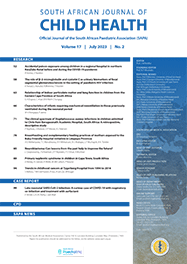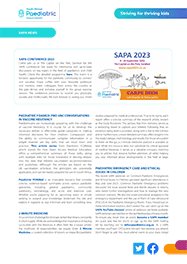Research

Response to corticosteroid treatment in paediatric nephrotic syndrome: A retrospective review from Mozambique
Abstract
Background. First-line treatment for paediatric nephrotic syndrome, a chronic disease characterised by proteinuria, hypoalbuminaemia and oedema, is corticosteroid therapy. An association between African ethnicity and steroid resistance has been reported, but published data from sub-Saharan Africa are limited and lack consensus on the prevalence of steroid-resistant disease.
Objective. We aimed to describe a cohort of paediatric patients with nephrotic syndrome, determine the frequency of steroid resistance, and investigate factors associated with steroid resistance at Hospital Central de Maputo, Mozambique.
Methods. A retrospective chart review was performed for paediatric patients (1 - 14 years old) admitted with nephrotic syndrome between 2010 and 2015 with at least one follow-up visit by 31 March 2016. Patients with HIV or malaria were excluded. Descriptive statistics and frequencies disaggregated by treatment response were produced. Associations of treatment response with sociodemographic, clinical and laboratory variables were investigated by appropriate univariable statistical tests.
Results. Twenty-eight patients met inclusion criteria and were characterised as having steroid-sensitive or steroid-resistant nephrotic syndrome based on response to an initial corticosteroid regimen. There were 15 boys (53.6%) and 13 girls (46.4%), with a median age of 5.5 years. Fifteen (53.6%) were steroid-sensitive, and 13 (46.4%) were steroid-resistant. Steroid-resistant patients had significantly lower diastolic blood pressure (p=0.004), lower serum haemoglobin (p=0.003), lower serum albumin (p=0.03) and higher platelet counts (p=0.008) compared with sensitive cases. Only 4 (30.8%) steroid-resistant patients received a kidney biopsy.
Conclusion. Given the relatively high occurrence of steroid resistance in this study, expanding access to kidney biopsy and second-line medications for paediatric patients not in remission after an initial course of corticosteroid therapy is needed to meet the current standard of care. Factors associated with steroid resistance need to be studied prospectively in larger cohorts of Mozambican children.
Authors' affiliations
Y Monteiro, Hospital Central de Maputo, Maputo, Mozambique
Kara Faktor, University of California Los Angeles David Geffen School of Medicine
WC Buck, Hospital Central de Maputo, Maputo, Mozambique; University of California Los Angeles, David Geffen School of Medicine, Los Angeles, California, USA
S Taunde, Hospital Central de Maputo, Maputo, Mozambique
E Jeque, Hospital Central de Maputo, Maputo, Mozambique
S Kakar, Hospital Central de Maputo, Maputo, Mozambique
D Puliyanda, Cedars-Sinai Medical Center, Los Angeles, California, USA
Full Text
Cite this article
Article History
Date published: 2021-04-30
Article Views
Full text views: 669

.jpg)



Comments on this article
*Read our policy for posting comments here